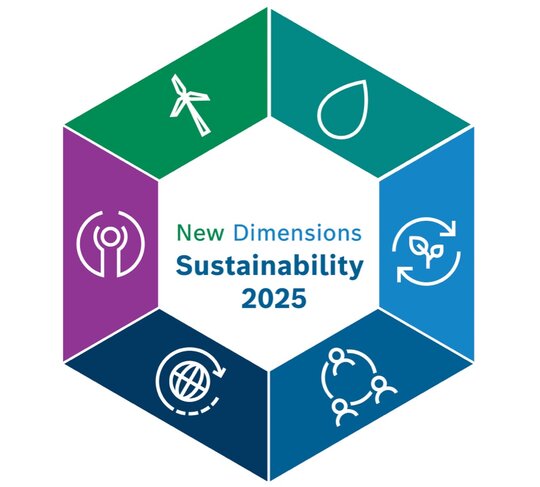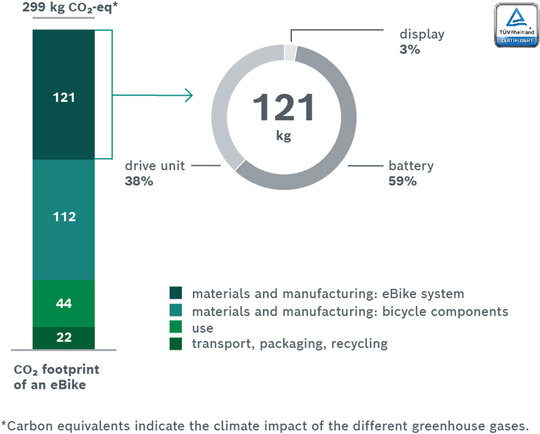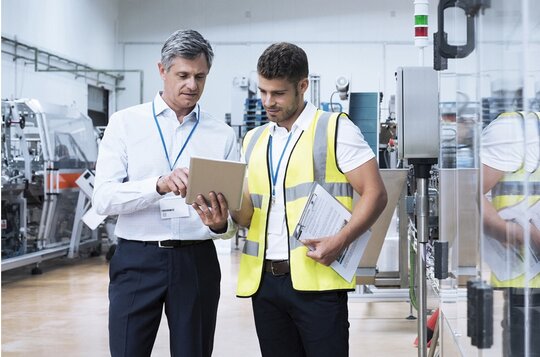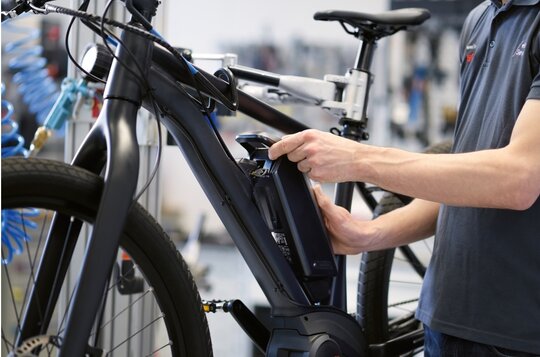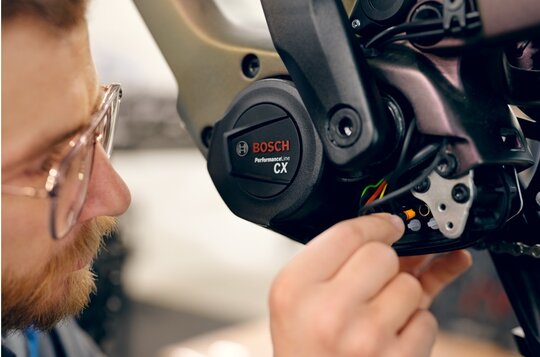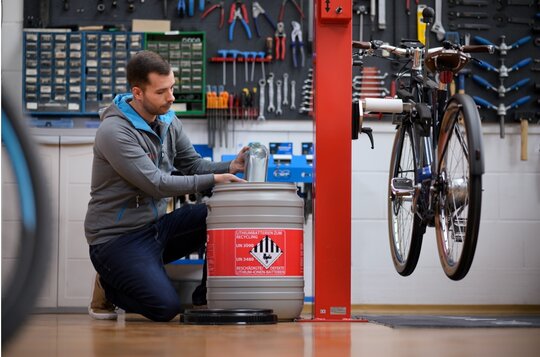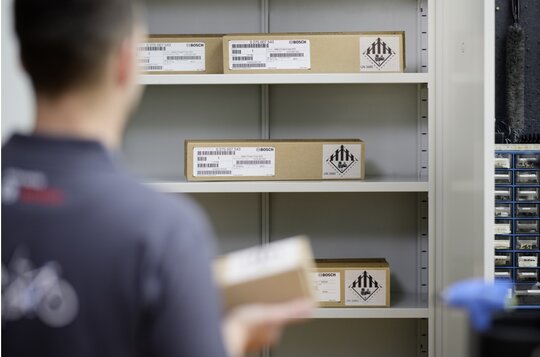Sustainable mobility with the eBike
Our mobility is responsible for more than a fifth of all CO2 emissions worldwide. Riding an eBike helps to lower this value because it enables us to reduce traffic and its impact on the environment. eBikes require little space and don't create noise or exhaust fumes. The switch is a win for the environment. And therefore for every one of us.
But switching to an eBike is just one of many steps toward sustainable mobility. For Bosch eBike Systems, the journey begins much earlier: On this page, we show you how we continuously work toward making the eBike life cycle more ecologically, economically and socially sustainable, and we explain the role sustainability plays for the entire Bosch company. We also provide tips and tricks for more sustainable eBiking and general information on the sustainability of eBikes.


Compared to other means of transport, the eBike is a very environmentally friendly way of getting around – more flexible, quieter and more climate-friendly.

CO2 emissions in comparison
The eBike is a response to the issues and challenges of our time: resource scarcity, climate change, urbanization. eBikes are a more efficient alternative to other means of transportation, particularly over short distances. People who ride eBikes save money and with less environmental impact.
Although eBike components, such as the battery or drive, cause more emissions during production than standard bicycles, people on eBikes ride much more often and for significantly longer distances. In everyday life, the eBike can be used instead of the car in many situations, such as going shopping with a cargo bike. The energy required is very low at around 11.2 Wh of electricity per mile traveled.
If you only consider the time spent on the road with your eBike, the power consumption results in an average CO2 emissions value of 3.2-8 g/mile, depending on the power mix. In comparison, according to the Federal Environment Agency, a car emits about 240 g CO2 per passenger mile (pkm), while public transportation emits between 80 and 176 g CO2 per passenger mile. Compared to all other means of transportation, the bicycle and the eBike have significantly lower emissions.
The eBike is therefore even more sustainable on the road.
We have compiled some tips and tricks for more sustainable eBiking. For more efficient use of the battery, for an even longer range and a longer service life, and for environmentally aware behavior on the trail.
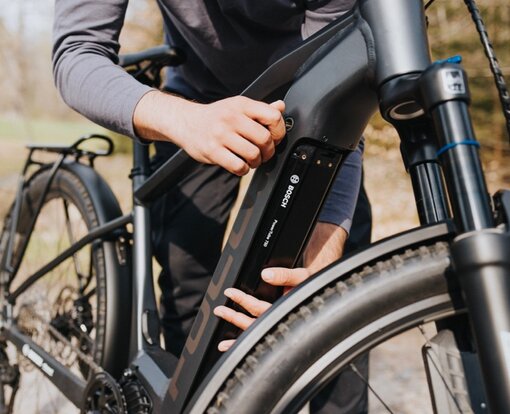
The battery is responsible for a large part of your eBike's carbon footprint. So using it correctly is crucial - not only for your peace of mind, but also for greater sustainability. With the right handling and care, you can optimize the service life of your eBike's battery. Find out more about sustainable handling and use in our Battery Guide.
Sustainability at Bosch eBike Systems
Sustainability is a shared responsibility, and we at Bosch eBike Systems have set our sights on a sustainable future. As part of the Bosch Group, we share a common goal: We want our products to contribute to a climate-friendly future in which people are mobile in a sustainable, flexible way, with greater riding enjoyment.
Taking responsibility – tackling challenges.
The idea of sustainability is not only a necessity for Bosch eBike Systems, it is a matter of responsibility. The overarching Bosch sustainability strategy "New Dimensions – Sustainability 2025" describes the company's goals based on six fundamental areas: climate action, health, human rights, water, circular economy, and diversity. At Bosch eBike Systems, we are particularly committed to three strategic pillars of the global sustainability strategy:
- minimizing the carbon footprint of our products,
- responsibility and transparency in the supply chains and
- the development of a functioning recycling economy.
From the moment we start to develop a product, we pay close attention to its environmental impact. Based on this "Design for Environment" approach, we consider how a new product can be designed to be as sustainable as possible, across the entire value chain. This starts with the selection of environmentally friendly raw materials and the use of recyclables, continuing through energy-saving manufacturing steps to the design of packaging that is as sustainable as possible.
Carbon footprint
Sustainability is a key criterion in our product development. We carry out ecological assessments, evaluate product-specific environmental aspects at every stage of the life cycle and work continuously to improve them.
Carbon footprint and life cycle analysis
The carbon footprint over the entire life cycle is a key metric when comparing the sustainability of products. In a so-called life cycle assessment (LCA), we evaluate product-specific environmental aspects in each life cycle phase – from procurement, manufacturing and use to disposal.
Together with TÜV Rheinland, we have calculated the average carbon footprint for an eBike and for the Bosch eBike system components (drive unit, battery, display, control unit) in detail and identified the greatest potential savings.
The result: Over its entire life cycle – from production to recycling – an eBike generates a carbon equivalent of approximately 661 lbs. Around 75% of CO2 emissions are produced by materials and manufacturing, around 15% during actual use of the eBike, and the remaining 10% or so during transport, packaging and recycling. At 267 lbs, approximately 36% of the total footprint is produced by the eBike system, in other words: the components that turn a bicycle into an eBike. The lion's share of this is produced by the eBike battery.
Using this data, we can identify negative impact on the environment and thus design products that are more sustainable in the future.
Supply chain responsibility
We are working on a systematic analysis of the social and ecological risks along the entire value chain. Our goal is to achieve full transparency in our supply chain for all Bosch eBike products.
Transparency in the supply chain
A key pillar of our sustainability activity is a transparent supply chain that enables comprehensive tracing of critical raw materials. The eBike battery in particular is the focus here. For example, in 2021, we developed a "sustainability questionnaire" in collaboration with battery cell suppliers to find out important details about the supply chain – right back to the procurement of raw materials at the mine. We intend to broaden the scope of this to include other eBike system components that contain materials such as aluminum and magnesium – such as the drive system and the control unit. The results will also be verified by appropriate assessments. Want to learn more about the Bosch Global Supply Chain Standards? Further information is available here.
Cobalt in battery cells
In order to continuously reduce the amount of critical raw materials in eBike batteries, we are working together with our suppliers to advance the technological development of battery cells. Since 2013, we have already succeeded in reducing 65% of the cobalt content in the cathode of the eBike battery cell through technical developments. Our goal is to further reduce the cobalt content while increasing the capacity of the battery cell.
Recycling economy
We are working to offer and improve recycling solutions in all our markets, e.g. by jointly establishing or advising industry solutions and by contacting recycling companies directly. The recycling economy pillar also includes the development of new packaging and transport concepts.
Remanufacturing of eBike drives
Repairability and easy maintenance are two of our most important criteria in product development and are essential cornerstones of a functioning recycling economy. We provide independent bicycle retailers with the knowledge and tools to carry out maintenance and minor repairs to the drive unit. Bosch eBike drive units that are replaced free of charge under warranty and goodwill are reconditioned, which means that the drives are technically overhauled and, after a final test, are made available to the customer again with full functionality.
Recycling eBike batteries
Once a battery has reached the end of its lifetime, it must be disposed of appropriately. We would urge the users of our eBike systems to take defective or disused batteries to their local dealer, who will ensure they are disposed of in the appropriate manner. Appropriate recycling practices save resources, and valuable raw materials are returned to the materials cycle. Bosch eBike Systems supports new and sustainable recycling methods. The efficiency of recovery depends on the recycling process. New recycling processes can have a recycling efficiency of over 90%.
In most cases, the return and recycling of batteries is free of charge for eBike riders.
New packaging and transport concepts
Since September 2020, eBike drives from Bosch eBike Systems have been delivered in sustainable and easy-to-recycle molded fiber packaging instead of polystyrene. This not only saves material and recycling costs, but also ensures optimized packing density during transport and storage – and ultimately leads to CO2 savings of approx. 45%. In addition, following extensive testing, we were able to dispense with the plastic wrapping on our PowerTube batteries, saving approx. 20% of CO2 emissions for this packaging. We also deliver our products on Euro pallets, which are exchanged and reused after unloading.
What is Bosch doing in terms of sustainability?
Economic, ecological, and socially responsible action is the foundation for our success – this conviction guides our entire company and is reflected in all areas of our activities.

Pioneers in climate protection
At Bosch, we share a common goal: we aim to improve the quality of life for people and protect the livelihoods of present and future generations by acting in a sustainable manner. We are playing a pioneering role in climate protection in particular. With its more than 400 locations worldwide, the Bosch Group has been carbon neutral overall (scopes 1 & 2) since 2020. As part of this, residual emissions of 0.7 million metric tons of CO2 were offset with carbon credits in 2022. Scopes 1, 2, 3 are used according to the Greenhouse Gas Protocol Corporate Accounting and Reporting Standard. Now, we want to optimize the mix of measures and, in so doing, further decrease the environmental impact. At the same time, we intend to shape climate protection beyond our direct sphere of influence and also systematically reduce upstream and downstream emissions – our aim is to reduce emissions by 15% by 2030.
Sustainability-FAQ
eBike as a sustainable means of transport
The bicycle is one of the most sustainable means of transport. With very low material input and vehicle weight, it enables flexible, emission-free, quiet and climate-friendly mobility. In addition, regular cycling is also good for your health.
The eBike is the next evolutionary step in cycling. It allows you to go on longer trips, cover longer distances and overcome greater differences in altitude. Overall, eBikes significantly expand the possibilities for use without significantly changing the characteristics and CO2 emissions in the production of the eBike compared to the bicycle. Even though more energy is required for the battery and drive than for a bicycle, especially in production, riders are increasingly using their electric bikes in everyday life, often replacing the car and other means of transport. In addition, users ride more frequently and cover significantly longer distances on their electric bikes. In addition, the energy required is very low, averaging around 11 Wh of power per ride mile.
The average power consumption of an eBike with Bosch eBike system is about 11 Wh/mi. This value results from the R200 range test for eBikes with Bosch eBike system.
If we look at the CO2 emissions caused by the electricity consumption, the average CO2 value is 3.2-8 g/mi, depending on the electricity mix. If green electricity is used for charging, an eBike use even completely eliminates CO2 emissions. Compared with this, the CO2 emissions are around 240 g CO2/person mile (PMT) for a car and between 48 and 128 g/PMT for public transportation.
Together with TÜV Rheinland Energy GmbH, we have calculated and evaluated the Product Carbon Footprint according to ISO 14067. Over the entire life cycle of an eBike (including all phases: from manufacturing, packaging, transport to use and recycling), the average carbon footprint is 661 lbs CO2e.
This means that the footprint of an eBike is roughly twice that of a conventional bicycle. This is an average value, and deviations may occur depending on the model. Over its entire life cycle, the eBike has a relative carbon footprint of about 24-40 g/mi, depending on the total mileage covered. If we consider the pure use phase and thus the emissions caused by electricity consumption, the average CO2 value is 3.2-8 g/mi, depending on the electricity mix.
Over the entire life cycle of an eBike (including all phases: from manufacturing, packaging, transport to use and recycling), the average carbon footprint is 661 lbs CO2e. This means that the footprint of an eBike is roughly twice that of a conventional bicycle. This is an average value, and deviations may occur depending on the model.
For an objective comparison, however, it is important to consider the fact that riders are increasingly using their electric bikes in everyday life and are thus often replacing the car or other means of transport here. In addition, users ride two to three times more frequently and cover significantly longer distances on their eBikes.
Overall, an eBike has an average carbon footprint of 661 lbs CO2e. Around 265 lbs CO2e of this is attributable to the Bosch eBike system.
The emissions for the eBike system have already been amortized after 497 miles if the eBike is used instead of the car, and the emissions for the entire eBike are amortized after 1,243 miles.
These figures are average values. Depending on the model, there may be deviations.
Sustainability at Bosch eBike Systems
General
For Bosch, climate protection is an essential part of corporate responsibility. With its more than 400 locations worldwide, the Bosch Group has been carbon neutral overall (scopes 1 & 2) since 2020. We achieved carbon neutrality by using four levers: increasing energy efficiency, generating our own energy from renewable sources (new clean power), purchasing electricity from renewable sources (green electricity), and – as a last resort – offsetting residual CO2 emissions. In 2022, residual emissions of 0.7 million tons of CO2 were offset through carbon credits. Scopes 1, 2, 3 are used according to the Greenhouse Gas Protocol Corporate Accounting and Reporting Standard.
Sustainability also plays a central role at Bosch eBike Systems and is part of the corporate strategy. At Bosch eBike systems, we are particularly committed to three strategic pillars of the global sustainability strategy:
- minimizing the carbon footprint of our products,
- responsibility and transparency in the supply chains and
- the development of a functioning recycling economy.
More information can be found here.
Cities face huge challenges in the 21st century. The world's population is growing, resources are dwindling, and our climate is changing. Solutions are required. E-mobility can make a significant contribution to sustainable city development and a liveable urban environment. Pedelecs in particular offer great opportunities. They help save resources as well as reducing emissions. Pedelecs are an effective and efficient means of transport, particularly over short distances. People who ride eBikes get around faster, cheaper and with less environmental impact. Pedelecs have great potential in terms of transport policy, especially in urban areas.
Every time we develop a new product or enhance an existing one, we look at how we can reduce the impact of our products on the environment throughout their life cycle. A key factor here is achieving consistent material savings by developing and designing subsequent generations of our components to be ever smaller, more compact and lighter. By reducing the number of parts, we reduce the amount of material required: Fewer raw materials are needed and the effort required in development and production is significantly simplified. One example is the weight reduction of our drive units. For example, the Performance Line CX in the Bosch eBike System 2 achieved weight savings of approx. 25% compared to the predecessor model. By standardizing our products and limiting the number of variants and parts, we achieve scaling in the manufacturing processes, which leads to a reduction in the energy required per part. Further examples can be found in our packaging strategy. Since September 2020, our drives have been delivered to our customers in sustainable molded fiber packaging. In addition, after extensive safety testing, we were able to eliminate the use of plastic outer packaging for our PowerTube batteries, saving about a quarter of the CO2 emissions for this packaging.
Responsibility in the supply chain
As a division of Bosch, Bosch eBike Systems is integrated into the plant network of the overall company. The components of our eBike systems are developed at the Bosch eBike Systems headquarters in Reutlingen, Germany. Production and consolidation of the drives take place at the Bosch plant in Miskolc, Hungary. Production and consolidation of the batteries also mostly take place at the Bosch plant in Miskolc, Hungary, with some work also taking place in Penang, Malaysia.
Bosch eBike Systems does not source raw materials such as lithium, but buys them as part of the cells from lithium-ion cell suppliers. A key pillar of sustainability activities in the eBike sector is a transparent supply chain that enables comprehensive tracing of so-called critical raw materials. For example, comprehensive information on the supply chain is requested from our cell suppliers and traced back to raw material procurement. In general, our suppliers must meet strict requirements based on the principles of the UN Global Compact, the core labor standards of the International Labor Organization (ILO), and Bosch standards that in some cases go beyond these.
In general, Bosch eBike Systems aims for a spare parts availability of at least 6 years after the products were last delivered to the eBike manufacturer. In individual cases, however, we may not be able to meet this target if, for example, our suppliers can no longer provide individual components. If necessary, we suggest alternative components, e.g. upgrades.
Circular economy
The use of materials with recycled content is considered in every development project and is critically examined, particularly with regard to product requirements and safety standards; we will continue to drive this forward in the future. As of today, the share of recycled materials in eBike components is still low. The material mix in our products is designed for the specific application and thus optimized to meet high requirements in terms of reliability and reproducibility. In the case of packaging materials also, we examine how the material mix can be designed to be as environmentally friendly as possible. The aim is to reduce the use of disposable packaging and to continuously increase the use of sustainable packaging materials and reusable packaging, for example. One example can be found in our packaging strategy. Since September 2020, our drives have been delivered to our customers in molded fiber packaging.
Retrofit and repair capability are key issues in the context of sustainable product development and thus an important part of our sustainability strategy.
Maintenance work and minor repairs to the drive unit can be carried out by bike dealers. This includes, for example, the use of a drive unit repair kit, regreasing or the replacement or retrofitting of bearing protection rings. If a larger defect is established, the motor will be collected from the dealer by Bosch. With some fault patterns, the drive units undergo a remanufacturing process in a service case. This means that drive systems that qualify for this after appropriate testing are reconditioned. After an "end-of-line" test, they are made available to the customer again with full functionality.
However, we also always consider repair concepts in the context of product safety. For Bosch eBike Systems, the safety and reliability of the products come first. Consequently, in the event of a damaged product, repair may not be reasonably feasible in this regard. In such cases, complete replacement of the product is required. Bosch is committed to finding the best possible solution so that riders can get on their bikes again quickly and enjoy them for a long time.
Electrical appliances can be taken to any recycling center. Small electrical appliances can also be returned to specialist retailers, provided that the sales area there is more than 400 m2. Before disposal, all removable batteries must be removed from the electrical appliance and taken to a battery collection system. Please note that personal data may be stored on displays, so delete this if necessary before disposal.
Sustainability of the Bosch eBike battery
General
Bosch eBike batteries use cylindrical lithium-ion cells. The cell technology is quite comparable to the cells installed in some electric cars. About 5000-8000 cylindrical cells are used per electric car, compared with just 40 to 60 for common eBike batteries. One electric car therefore corresponds to an average of about 130 eBikes in terms of cell quantity.
The lithium-ion cells used in Bosch eBike batteries are state-of-the-art. Currently, cobalt is still required. Cobalt is responsible for high energy density in battery cells and thus improves the performance of the battery. Together with our suppliers, we are working to further develop the technology of battery cells in order to continuously reduce the proportion of critical raw materials such as cobalt in the eBike batteries. The cobalt content in the cathode has already been reduced by 65% since 2013.
Everyone can hand in their old or defective eBike battery free of charge at any bicycle retailer, who will forward it for environmentally friendly recycling. You do not need to purchase a new battery to use this service.
Please note that you should not touch severely damaged batteries with your bare hands, as electrolyte can leak out and cause skin irritation. Please store them in a safe place outdoors with the contacts taped off and take them to an approved bicycle retailer for proper disposal as soon as possible.
More information on battery recycling in North America can be found here.
The first priority for our products is a safe design, and this also applies to our batteries. High quality and safety standards enable robustness and durability. Optimally adapted cell specifications and lifetime-optimizing electronics contribute to maximizing the service life and energy throughput of the battery and thus to the most sustainable use of the battery materials. The distance covered by a Bosch eBike battery during its service life can even be up to 37,282 mi with appropriate use and treatment. In order to keep the ecological impact of the batteries low, we try to keep the proportion of so-called critical raw materials in the cells as low as possible in the development of the products, while at the same time increasing the proportion of recycled materials and complying with safety requirements. For example, the cobalt content in the cathode of battery cells has already been reduced by 65% since 2013. Furthermore, with the support of our cell suppliers, we ensure that we can track the entire supply chain to ensure more socially responsible raw material extraction.
Repair
Some providers claim they can recondition batteries. Bosch strongly advises against this because the safety and optimum interaction with the battery management system cannot be guaranteed in this case. In addition, there is a safety risk and opening or modifying the battery may void any warranty or guarantee claims.
For safety reasons, defective, old or "exhausted" batteries cannot be repaired or refreshed. Lithium-ion batteries are complex, finely tuned systems with a high energy content. In the event of a repair, correct functioning and optimum interaction with the battery management system can no longer be guaranteed. In addition, the tightness of the housing cannot be ensured when the battery is reassembled. For safety reasons, rechargeable batteries must pass extensive series tests in accordance with national and international legislation and normative requirements before they can be placed on the market. These series tests are not feasible for a single repaired battery due to the prescribed number of test samples. This includes, for example, housing tightness testing, as well as overcharging and short-circuit tests. If these tests are not performed, there is a high risk that moisture can enter the battery, for example. In the worst case, this can cause a short circuit and thus creates a hazard. All this can have safety-relevant consequences. For safety reasons, Bosch therefore strongly advises against having repairs carried out.
Reuse
Our batteries are specially designed and certified for use on eBikes. We cannot guarantee reliable operation in other areas of application.
Therefore, we expressly discourage second use and consider the proper return of defective or used lithium-ion batteries for recycling as the best method. New recycling processes largely recover valuable raw materials so that they can be used for the production of new cells. In addition, the recycling processes are considered to be environmentally friendly and contribute positively to the carbon footprint through the recovery of raw materials.
Recycle
Find a battery recycling location by visiting call2recycle.ca or contact the drop-off site locator at 1.877.2.RECYCLE (1.877.273.2925) to learn more or to find a drop-off site near you. (Sites equipped to receive eMobility batteries can be found using the
Locator tool and selecting “Accepts eMobility” under the search filter.)
Batteries must be properly disposed when they reach end of life. Materials recovered from recycled batteries, such as aluminum, copper, cobalt and nickel, are used in the manufacturing of new products. Bosch urges eBike riders to take batteries to the nearest approved collection site, a qualified dealer for recycling or local hazardous waste disposal facility.
If a rechargeable battery is defect: Warning: Direct contact with battery electrolyte may cause skin irritation.
Damaged or defective eBike batteries should be taken to the nearest approved collection site, a qualified dealer or local hazardous waste disposal facility for safe disposal. When not in use, damaged or defective batteries are best stored in a safe, outdoor location with their connection contacts taped.
The legal basis for recycling is regulated nationally. The battery manufacturer is responsible for recycling. However, as soon as the eBike crosses a national border as a product, the importer automatically becomes the manufacturer. In countries outside Germany, this is the bicycle manufacturer or bicycle retailer. Because of this national perspective, Bosch eBike Systems in Germany provides a direct solution for recycling. In all other markets in which we are active, e.g. the USA, Canada, Australia or New Zealand, we provide our customers with the best possible support in this respect and promote country-wide industry solutions if these do not yet exist in some regions at present.
Bosch eBike Systems is in contact with many recycling companies and supports new and sustainable recycling methods. The efficiency of recovery depends on the recycling process. Recycling efficiencies of up to over 90% are possible with new recycling processes.





